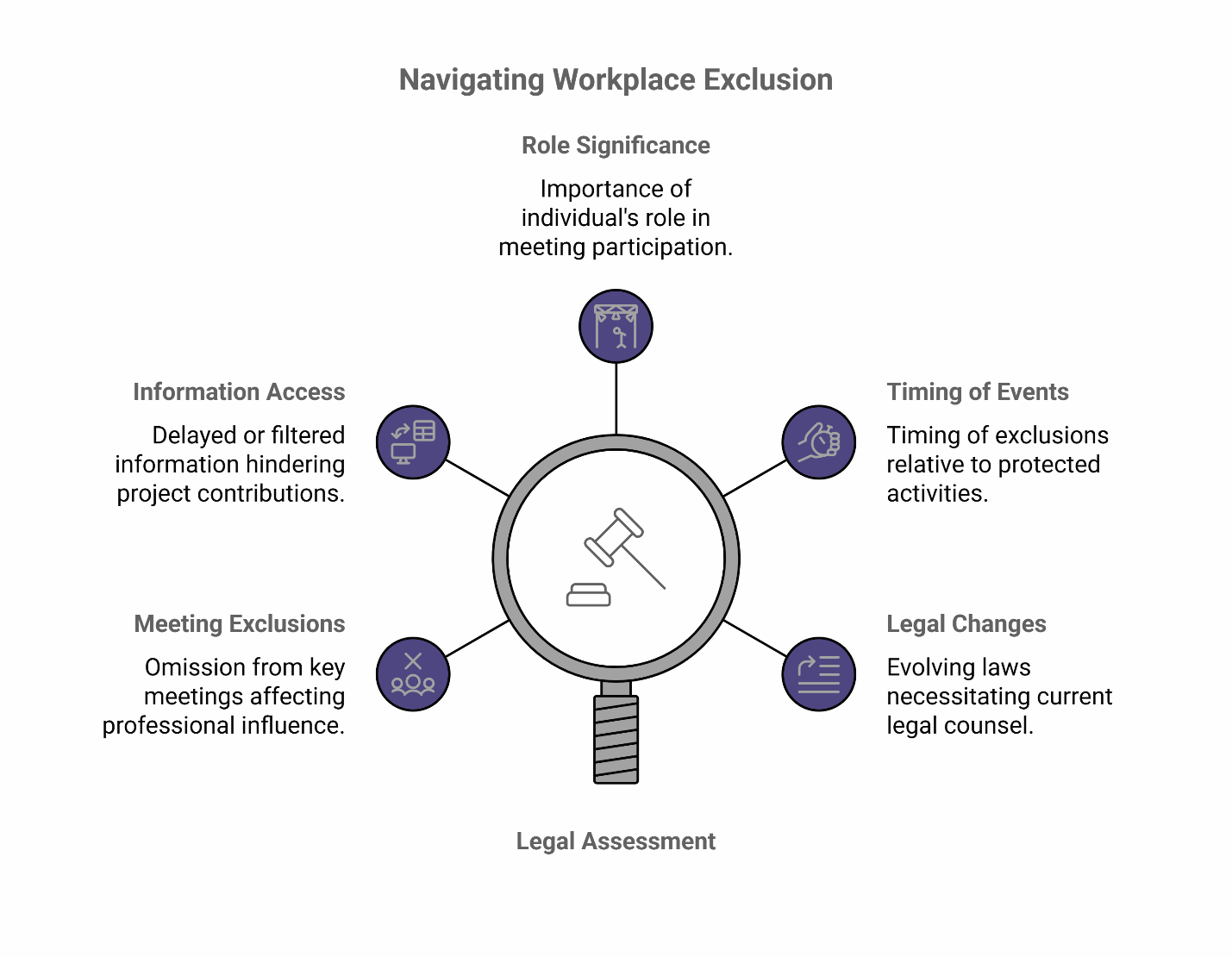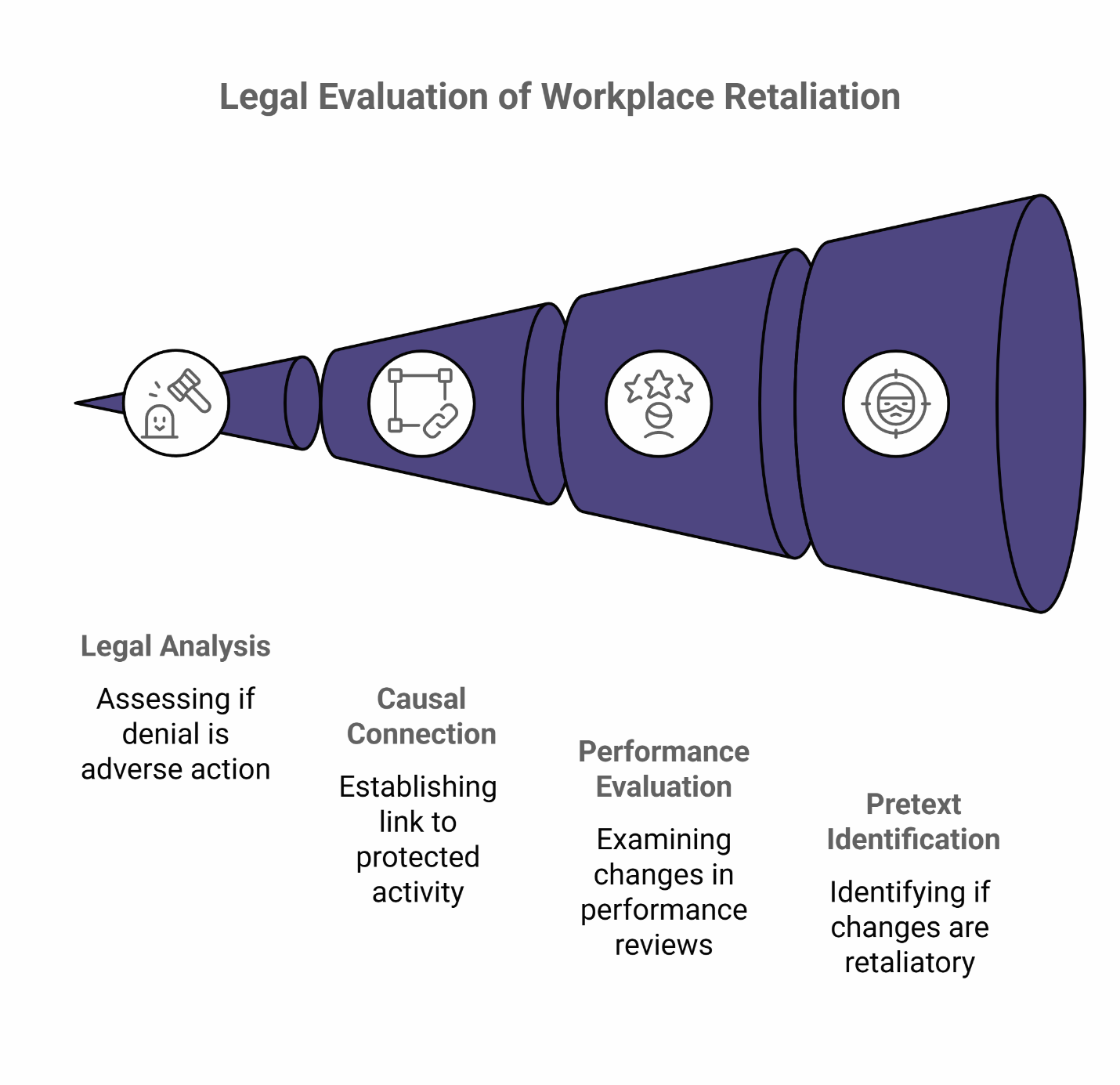📌 Key Takeaways
Professional Legal Evaluation Essential for Workplace Changes: Retaliation claims in New Jersey involve complex legal elements including causal nexus and temporal proximity that require specialized employment law expertise rather than self-assessment, particularly when workplace changes follow protected activity like filing discrimination complaints.
Exclusion Patterns Extend Beyond Traditional Adverse Actions: Public sources describe retaliation through meeting omissions, reduced client exposure, limited professional development access, and performance-related gatekeeping—subtle changes that may constitute materially adverse employment actions under New Jersey Law Against Discrimination and federal Title VII.
Race Context Adds Legal Complexity: Professionals of color in New Jersey corporate environments face intersecting discrimination and retaliation concerns that demand immediate professional consultation due to the sophisticated legal theories and evidence requirements involved in establishing these claims.
Timing Critical for Legal Protections: Employment law involves strict filing deadlines that vary by jurisdiction, making prompt consultation with qualified employment law attorneys essential rather than optional when experiencing workplace changes following protected activity.
This overview provides foundational context about less obvious retaliation patterns, but individual workplace situations require professional legal evaluation to determine actionable claims and protect legal rights within applicable timeframes. This content is informational only and does not constitute legal advice. Professional consultation with qualified employment law attorneys is essential for evaluating specific workplace situations.
Retaliation in New Jersey workplaces often extends beyond termination or demotion to include subtler patterns of exclusion and missed opportunities. Public sources frequently discuss how professionals of color may experience materially adverse changes in workplace dynamics following protected activity such as filing discrimination complaints or participating in workplace investigations. These less obvious forms of retaliation can significantly impact career progression in office-based corporate environments throughout New Jersey.
Understanding these patterns requires professional legal evaluation. Retaliation claims involve complex legal elements that vary significantly based on specific circumstances, making qualified legal counsel essential for anyone experiencing workplace changes following protected activity.
Exclusionary dynamics and lost opportunities represent workplace themes that public materials sometimes associate with adverse employment action. The New Jersey Law Against Discrimination (NJLAD) and Title VII of the Civil Rights Act of 1964 provide the statutory framework for these discussions, though laws and public guidance are subject to change.
Retaliation Discussed Beyond Termination or Demotion
New Jersey workplace dynamics may encompass broader patterns than traditional adverse employment actions. Public materials describing retaliation scenarios often reference situations where professionals experience changes in workplace treatment that fall short of termination but may constitute materially adverse impacts on employment conditions.
Professional legal consultation becomes essential when evaluating whether workplace changes constitute actionable retaliation. The legal standards for establishing causal nexus and temporal proximity require specialized knowledge that general informational materials cannot provide. Laws and public guidance are subject to change, making current legal advice crucial for specific situations.
Corporate environments in New Jersey present unique contexts where exclusionary behavior may manifest in ways that public sources sometimes characterize as potential retaliation themes. However, the complexity of employment law requires professional legal evaluation to determine whether specific workplace changes have legal significance.
Exclusionary Dynamics Frequently Noted in Public Discussions
Meetings and Information Flow

Meeting participation represents a significant aspect of corporate visibility and influence. Public discussions of workplace retaliation sometimes reference patterns where professionals find themselves omitted from key meetings or removed from distribution lists that previously included them. Information access may become delayed or filtered, affecting the individual’s ability to contribute meaningfully to projects or initiatives.
These subtle changes require professional legal assessment because determining whether meeting exclusions constitute adverse employment action depends on numerous factors, including the individual’s role, the meetings’ significance, and the timing relative to protected activity. Laws and public guidance are subject to change, emphasizing the need for current legal counsel.
Client and Account Exposure
Client-facing roles provide valuable professional development opportunities and industry recognition. Public materials discussing retaliation sometimes describe scenarios where professionals experience reassignment away from prominent accounts or find their client interactions systematically reduced.
Professional legal evaluation becomes critical when assessing whether client reassignments constitute retaliation, as the analysis may consider factors such as compensation impact, career development effects, and whether a reasonable employee would find the actions materially adverse. Consultation with qualified employment law attorneys is essential for evaluating these complex workplace changes.
Training, Conferences, and Networking Access

Professional development opportunities form a critical component of career advancement in corporate environments. Public discussions of workplace retaliation sometimes reference missed participation in skill-building initiatives, industry conferences, or networking events that were previously accessible.
The legal significance of denied training opportunities requires specialized legal analysis. Employment law attorneys evaluate whether such denials meet the standards for adverse employment action and establish the necessary causal connection to protected activity. Professional representation is typically necessary for these nuanced employment matters.
Performance-Related Gatekeeping
Performance evaluation processes can involve subjective elements that public sources sometimes discuss in connection with retaliation concerns. Shifts in evaluation emphasis, changes in ratings focus, or altered distribution of stretch assignments may create patterns that affect career progression.
These performance-related changes demand immediate professional legal consultation because evaluation patterns can constitute evidence of pretext in discrimination cases. The complexity of proving retaliatory intent through performance management requires specialized legal expertise that cannot be obtained through general information sources.
“Lost Opportunities” as a Workplace Theme
Career development pathways in New Jersey corporate environments often depend on mentorship relationships, sponsorship arrangements, and leadership development programs. Public materials discussing workplace retaliation sometimes reference impacts on these professional advancement mechanisms.
Professional legal assessment is essential when career opportunities become systematically unavailable following protected activity. Employment law attorneys evaluate whether lost advancement opportunities constitute materially adverse employment actions and establish the temporal and causal relationships required for legal claims. Laws and public guidance are subject to change, making professional consultation crucial for understanding current legal standards.
Networking opportunities and industry visibility represent intangible but valuable career assets. When these become less accessible following protected activity, qualified legal counsel is necessary to evaluate whether such changes meet legal thresholds for retaliation claims.
Race Context in New Jersey Corporate Settings (Informational)
Race discrimination discussions in New Jersey workplaces can intersect with retaliation concerns following protected activity such as filing complaints or participating in investigations. Public sources sometimes reference particular concerns for professionals of color who may experience retaliation after raising discrimination issues.
The intersection of race discrimination and retaliation requires specialized legal expertise. These cases involve complex legal theories and evidence requirements that demand professional representation rather than self-assessment. Employment law attorneys provide essential guidance for navigating these sensitive and legally complex situations.
Corporate environments present specific contexts where racial dynamics may influence workplace treatment. However, professional legal evaluation is truly necessary because establishing discrimination and retaliation claims requires meeting specific legal elements that vary based on jurisdiction and case law. Laws and public guidance are subject to change, emphasizing the critical need for current professional legal advice.
Legal Terms of Art Appearing in Retaliation Discussions
Public discussions of workplace retaliation frequently reference specific legal terminology: retaliation, adverse employment action, materially adverse, protected activity, causal nexus, temporal proximity, pretext, and hostile work environment.
Understanding the legal significance of these terms requires professional consultation because their application involves complex legal standards that cannot be properly evaluated through general informational materials. Employment law attorneys provide essential expertise for understanding how these concepts apply to specific workplace situations.
When Professional Legal Consultation Becomes Essential
Immediate professional consultation is necessary when experiencing workplace changes following protected activity because retaliation claims involve strict filing deadlines that vary by jurisdiction. The complexity of employment law may make self-assessment inadequate for evaluating potential legal claims.
Professional representation is typically necessary because establishing retaliation requires proving specific legal elements, including protected activity, adverse employment action, and causal connection. These determinations involve legal analysis beyond the scope of general information sources.
Qualified employment law attorneys provide proactive guidance for documenting workplace changes, understanding legal rights, and navigating complex procedural requirements. Consultation should occur promptly because employment law involves time-sensitive considerations that can affect legal remedies.
Scope and Limitations of This Overview
This informational overview centers on how public sources characterize potential workplace retaliation themes in New Jersey corporate settings. The coverage does not address legal procedures, filing deadlines, or case evaluation because these require professional legal assessment based on specific circumstances.
Individual situations demand professional legal evaluation by qualified employment law practitioners familiar with New Jersey law. This overview does not assess specific workplace situations or provide guidance on particular scenarios. Professional representation is truly necessary for evaluating whether workplace changes constitute actionable retaliation.
Laws and public guidance are subject to change. References here are for general informational context only. Current legal advice requires consultation with qualified professionals who can provide guidance based on current law and specific circumstances.
The consequences of legal decisions in employment matters can be significant, affecting both current employment and future career prospects. Professional legal guidance is essential rather than optional for these complex workplace situations.
Frequently Asked Questions
What does “less obvious” retaliation mean in public discussions?
Public materials sometimes describe patterns such as exclusion and reduced visibility beyond termination or demotion in New Jersey workplace contexts. However, determining whether specific patterns constitute legal retaliation requires professional legal evaluation because the legal standards involve complex elements that cannot be assessed through general information.
Are meeting omissions and missed opportunities discussed as retaliation themes?
Some public materials include these topics in broader retaliation discussions. Professional legal consultation is essential for evaluating whether specific workplace changes meet legal standards for adverse employment action and establishing the necessary causal connection to protected activity.
Why is professional legal consultation emphasized for retaliation matters?
Retaliation claims involve complex legal elements, strict filing deadlines, and sophisticated evidence requirements that make professional representation essential rather than optional. The legal consequences of these matters and the complexity of employment law make qualified legal counsel truly necessary for proper evaluation and representation.
Disclaimer: This content is for informational purposes only. This content is not legal advice. No attorney-client relationship is formed through this content. Please consult a qualified attorney in your jurisdiction for legal advice specific to your situation.
This page provides general information about New Jersey workplace topics. It does not constitute legal or professional advice and does not create an attorney-client relationship.
Statutes and legal materials are referenced by name only without interpretation. Laws and public guidance are subject to change.
Professional consultation with qualified employment law attorneys is essential for evaluating specific workplace situations. This page does not offer advice or case evaluation.
Experiencing Subtle Retaliation at Work? We Can Help.
At Zatuchni & Associates, we’ve built a strong reputation across New Jersey for representing professionals facing race discrimination and workplace retaliation—including the less obvious forms like exclusion, lost opportunities, or sudden shifts in treatment after protected activity.
If your work environment has changed after speaking up, don’t navigate it alone.
Contact us today to speak with an experienced employment attorney and get the legal clarity you need.
Prefer to learn more first? Browse our site for insights on your rights and options under New Jersey law.
You must be logged in to post a comment.